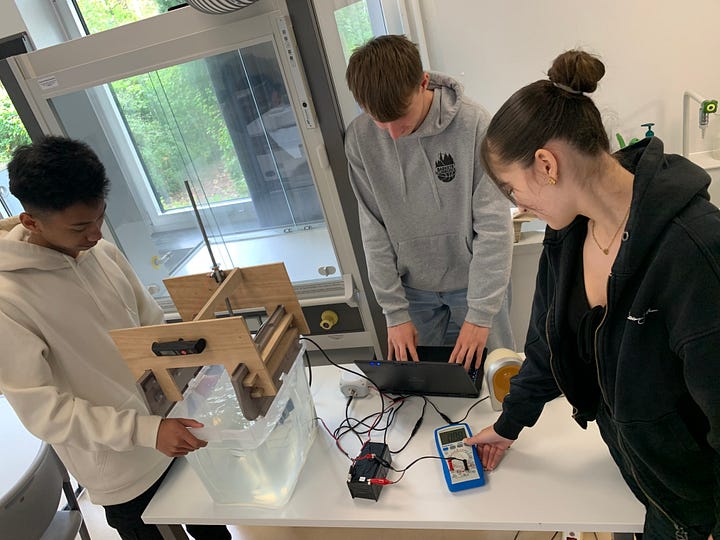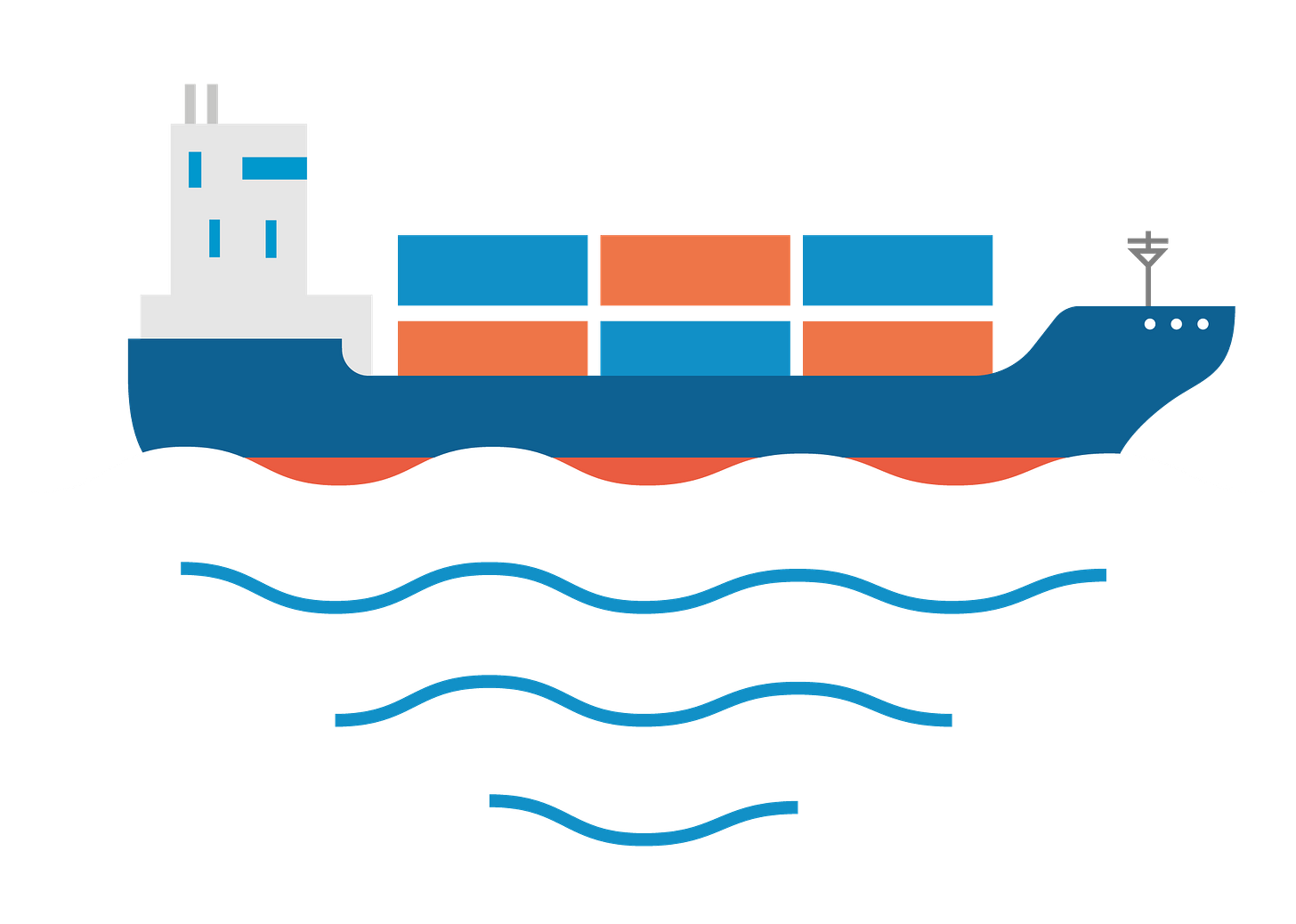Propellers & Posters on Reducing Underwater Noise
New educational resources and videos from the SATURN project
New Downloadable Poster for Classrooms!
We’re very excited to share with you a poster for classrooms about sound and the ocean! This poster explains concepts such as frequency, amplitude, and decibels, while also introducing students to sources of sound in the ocean. Spectrograms of the sounds made by a pilot whale, harbour porpoise, harbour seal, and a container ship show the differences between natural and anthropogenic sources of sound.
By scanning the QR Code in the bottom right corner, viewers will be taken to a new page on our website where you can listen to these sounds. To listen and download the poster, follow the button below!
This poster was a collaboration between Amy Dozier (University College Cork) and Rosalyn Putland (CEFAS). Thanks to our colleagues at Aarhus University and the University of Veterinary Medicine Hannover for providing sound files.
Testing a Trochoidal Propeller In France
Underwater radiated noise isn’t just produced by large container ships, it’s also produced smaller boats and ferries. One way we can reduce the harmful impacts of underwater radiated noise is by designing quieter propellers. In France, our partners at Naval Group and its subsidiary SIREHNA have been testing an exciting new concept that might change the future of ship design.
The idea? Mounting a ship with vertical blades instead of the conventional propeller design found on most ships (which looks similar to a household fan). This ’trochoidal’ concept, as it’s known, was tested on a perfectly scaled-down model of a BC Ferry (crafted by Formes et Volumes) on Lake Guerledan in March 2023. The propeller was provided by ADV-Propulse.
As the model ferry was piloted around the lake, SATURN researchers measured the underwater radiated noise produced by the trochoidal system. The results of these acoustic tests are currently being analysed and we are looking forward to sharing them with you next year. In the meantime, take a look at the video above to see how the trochoidal system works and watch the tests on Lake Guerledan using the model BC ferry.
Naval Group has also assessed the risk to marine life from this system, and has concluded that the trochoidal propeller does not pose more risk for collision or entanglement than a conventional propeller. For more information, visit our blog post.
Watch the Recording of Our Recent Webinar with DOSITS
If you missed September’s webinar on marine mammals and vessel noise, it’s now available to watch in full. Learn about the impacts of underwater radiated noise on marine mammals and potential solutions from SATURN researchers Dominik Nachtsheim (University of Veterinary Medicine Hannover) and Charlotte Findlay (Aarhus University). The webinar had over 1,000 people registered, with over 460 live connections!
You can catch the replay and download the presentations on the DOSITS website at https://dosits.org/decision-makers/webinar-series/2023-webinar/marine-mammals-vessel/.
Testing Our Prototype Educational Kit with Students in Germany


Our partners at the University of Veterinary Medicine Hannover joined a class of 17 year old students this month and guided them through an exploration of underwater noise and its effects on marine life. Starting with an in-depth analysis of the physical principles behind acoustics, the students then delved into the world of general shipping. How does a ship make noise? How does it affect whales, seals, fish and aquatic invertebrates? And how can this noise be reduced? We had a lively group discussion on the role of shipping in globalisation, discussing the pros and cons, and in the end, the students outlined ambitious goals to reduce global shipping noise, reduce CO2 emissions from ships and promote fair shipping.
A hands-on experiment allowed students to explore the performance of different types of model ship propellers. We looked not only at how much noise they make at different speeds, but also at other components such as energy consumption (represented in this experiment by the current drawn from the battery to the motor) and thrust (measured here by the pulling force on a scale). The aim was to show students how difficult technical solutions can be, as progress in reducing noise levels may be accompanied by a decline in efficiency. For shipping companies, but also in terms of greenhouse gas emissions, efficiency is of paramount importance.
We plan to make this activity available in multiple languages as an educational kit that can be deployed at schools around Europe. The students' commitment and interest was incredibly impressive! We feel confident that the future of marine research is in good hands.
Reducing Ship Noise with Bubbles 🛁
SATURN researchers at MARIN have been testing the effectiveness of 'bubble curtains’ in reducing underwater radiated noise from ships. This fascinating technology — which was originally used on military vessels for stealth — involves the injection of air bubbles into the propeller cavitation to dampen the sound it produces. Despite having been applied to naval ships for many decades, there is a lack of quantitative information on their effectiveness in open literature. Based on our tests, we've found that this measure can reduce Underwater Radiated Noise by up to 20 dB!
In the video above, enjoy watching a test of the 'prairie-like’ system showing cavitation dynamics and interaction with air captured by high-speed video cameras at MARIN.
Learn more about these tests and see more photos at https://www.saturnh2020.eu/post/mitigating-ship-noise-using-bubble-injection.
In case you missed it…
Watch the short (8 min) Euronews ‘Ocean’ documentary on underwater noise and what researchers are doing to curb it in Europe. Skip to 5:48 to see SATURN researcher Joseph Schnitzler from the University of Veterinary Medicine Hannover to learn about his work on harbour seals in Germany! [Link]
Download a list of acoustic measurements and statistics that are being implemented within the SATURN project to ensure that fundamental quantities are computed similarly and are comparable. [Link]
SATURN is an EU-funded project researching solutions to the problem of underwater radiated noise caused by shipping and other vessels. Learn more about SATURN at www.saturnh2020.eu.






